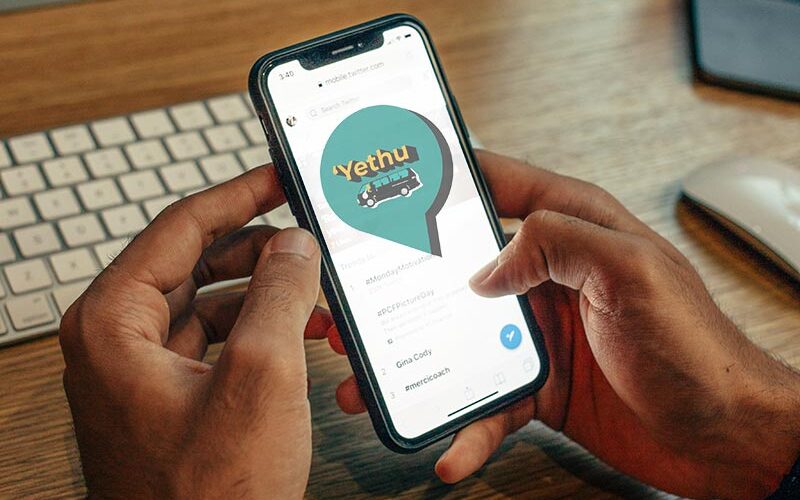AFRICAN MIRROR REPORTER
A new cell phone app uses the power of minibus taxis to deliver goods to South Africa’s township households and spaza shops

Yethu is a new app that allows people in areas not serviced by traditional delivery services, to order groceries and have them delivered to their door, by a mini-bus taxi. Last week Yethu successfully rolled out their pilot in Soweto, with almost 2000 customers engaging with the service, 7000 taxis available across the taxi associations as well as securing strategic partnerships with Pick n Pay, FutureLife and Tyme Bank.
Yethu – which means ‘ours’ in isiZulu – is an inclusive servicing app, designed to add dignity and quality of life to township and rural households.
Vuyo Radebe, director of Yethu, says, “We are leveraging the power of the taxi industry, an integral part of our daily lives, to save our people money and time while allowing taxi drivers to increase their earnings. I have always been interested in finding innovative solutions that benefit our society. We developed Yethu to empower our communities. We want the community and the taxi industry to feel their own potential, to see it as a way to support themselves, respond, take action, and have control over their situation,” he says.
For R30, about the cost of a return taxi trip, anyone – from rural and township households – can order their weekly or monthly shopping to be delivered to their door, saving them time and the struggle of getting heavy goods home. “Focusing on building an inclusive ecosystem, spaza shops form part of our partner network and using the taxi industry potentially gives us the largest reach for distribution,” Radebe added.
Radebe explains how the app works: “The sign-up process is simple. Customers and taxi drivers register online via the Yethu landing page. Customers are sent the Yethu app to download, load their payment method (bank card or prepaid) and they’re ready to place an order. You’ll receive a notification of your order, the delivery time (always within 12 hours) and you can track your order in real time. Once delivered you can rate the driver.
“Drivers and taxi bosses are incentivised to provide a good service,” says Radebe. “Although taxis work hard during peak times, there is latent capacity during their off-peak times, when they’re often parked for hours a day. This is when they can earn extra money doing Yethu deliveries.”
Yethu will perform background checks on all drivers as part of the registration process along with customer service education. Drivers with better client ratings on the app will get delivery preference for future deliveries. Orders are aggregated to simulate a full load and paid at a premium. “Taxi owners are incentivised to ensure the safe delivery of goods. Our focus is on driving positive relationships with taxi owners and drivers through revenue sharing and ongoing engagement.
“COVID-19 and the lockdown have highlighted structural opportunities and the need to find innovative solutions to old societal problems. In the last few months we have seen online retail skyrocketing while logistics companies have been ill-equipped to take up the demand, especially in our townships. No fleet is better equipped or more abundant than the taxi industry. Under pressure after months of restrictive lockdown measures, our communities are facing increased taxi fares, millions of jobs lost and higher food prices. We developed Yethu in response to this,” he says.
“We also know that with food being more expensive, people prefer to buy in bulk as it saves money, especially heavy items like maize, sugar and baby formula which are a challenge to get home,” he says. Yethu offers customers bundles of products, pre-secured through our partnerships with retailers like Pick n Pay. Bundles to choose from include a week’s worth of baby goods (nappies, formula, wipes), pantry essential bundles (mielie meal, stock, canned vegetables, long life milk) or cleaning bundles.
Yethu has also established a partnership with FutureLife, the food as medicine brand that offers affordable, highly nutritious, healthy meal options. Future Life is focused on addressing global health trends where HIV, diabetes and obesity are serious problems. “This is a great partnership for us,” says Radebe, “as we are focused on getting healthy food into our communities.”
Bundles range from about R90 to R500. “Using discounts from suppliers and retailers and delivery efficiencies, the all-in price charged to the client is roughly equal to what they would’ve paid had they bought at a retailer, including their transport fare. Beyond the pilot, we will include deliveries from pharmacies, hardware stores and take-aways,” he says.
“Yethu’s focus is on inclusivity and serving our communities. As the name suggests: Yethu is ‘ours’. A solution built by us, for us. An app that allows everyone to work together. We’re especially proud of this product as it inspires hope and optimism and delivers a positive societal impact,” says Radebe.
“It’s time to create inclusive products and partnerships. Let’s turn our taxi network into a powerful logistics engine and give our families and people the convenience that they deserve.”














